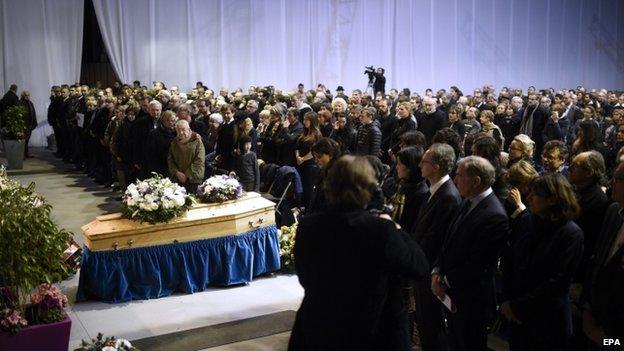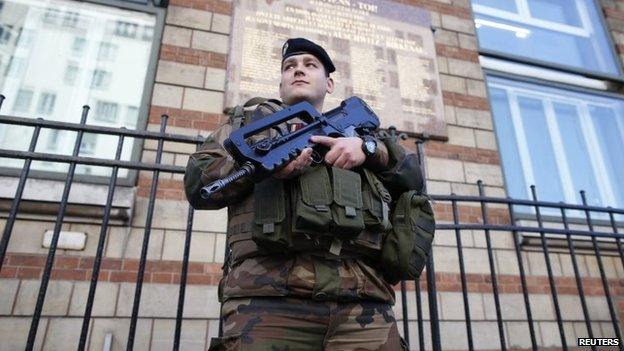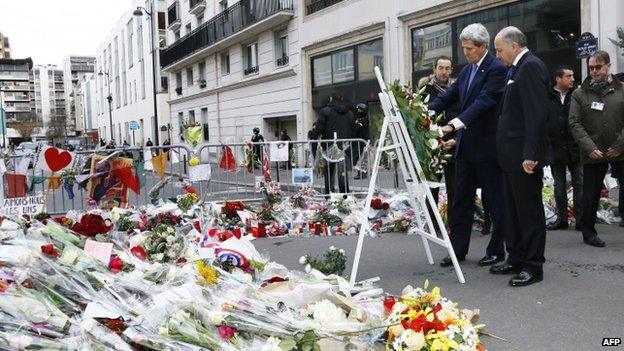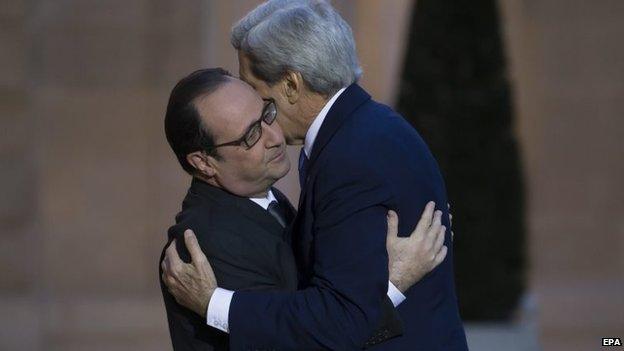Paris attacks: Twelve suspects held overnight
- Published
US Secretary of State John Kerry visited the Charlie Hebdo offices, as the BBC's Chris Eakin reports
Twelve suspects are being held by police in the Paris region over last week's attacks in the French capital that killed 17 people.
They are being questioned about "possible logistical support", such as weapons or vehicles, they could have given the three gunmen, police say.
Police conducted raids in five towns in the Paris region.
Last week's violence began with an attack by two gunmen on Charlie Hebdo magazine, which left 12 people dead.
A day later - on 8 January - a policewoman was shot dead by gunman Amedy Coulibaly while responding to a traffic accident in the south of Paris.
Four more people who were held hostage by Coulibaly were killed on 9 January when police stormed a kosher supermarket. Coulibaly was shot dead by police. Police also killed the two gunmen responsible for the Charlie Hebdo attack - Said and Cherif Kouachi - outside a warehouse near Paris earlier that day.
Three members of the magazine's staff were buried on Friday, including the editor Stephane Charbonnier, also known as Charb. Bagpipers played Amazing Grace at his funeral in the Pontoise district of Paris.

Scores of mourners attended the funeral of Stephane Charbonnier in the Pontoise district of Paris

Paris has been on high alert following last week's attacks
In the latest development, police carried out raids in the towns of Montrouge, Grigny, Chatenay-Malabry, Epinay-sur-Seine and Fleury-Merogis overnight, iTele reported.
Also on Friday, the Gare de l'Est train station in Paris was evacuated for an hour over a bomb threat, train operator SNCF told the BBC. Services resumed at 09:00 local time (08:00 GMT), SNCF said, without giving further details.
French authorities say that about 120,000 police and soldiers are now mobilised across France and that anti-terror plans remain in place.

Analysis: Gordon Corera, BBC security correspondent
European security services and police are bound to be nervous at the moment. Arrests and raids have been taking place in a number of countries. There is no sign of a direct connection between the different cells and individuals being targeted but the fear may well be that jihadists accelerate existing plans or decide to carry out an attack in the wake of events in Paris and Belgium.
The fact that there is no connection can make it harder to track those who may pose a threat since it may range from those who have returned from Iraq and Syria to lone, self-starting actors who are merely inspired by recent events.
There is the added complication of al-Qaeda in the Arabian Peninsula seeming to be behind the Charlie Hebdo attack, meaning those with links to Yemen may also need to be watched more closely. All of this means that the authorities will be doing what they can to work out which targets they need to prioritise and hoping they do not miss anything.

Prime Minister Manuel Valls said on Friday that France and Belgium were facing the same threats, but added that there were no links between the events in France and Belgium's anti-terror raid on Thursday.
Spain has also launched an inquiry after it was revealed that one of the Paris gunmen, Amedy Coulibaly, had visited Madrid days before the attacks.
'Pain and horror'
US Secretary of State John Kerry is in Paris to pay tribute to those killed in the attacks.
He hugged French President Francois Hollande, saying: "We share the pain and the horror of everything that you went through."

John Kerry and Laurent Fabius paid tribute outside the offices of Charlie Hebdo

John Kerry (right) told Francois Hollande the US shared the pain of what France went through
Mr Hollande said: "You've been victims yourself of an exceptional terrorist attack on September 11 [2001]. You know what it means for a country."
"We must find together appropriate responses," Mr Hollande added.
Mr Kerry laid wreaths outside the Jewish supermarket and the Charlie Hebdo offices.
Later on Friday, he will meet Paris mayor Anne Hidalgo for a remembrance ceremony.
The White House had admitted an error in not sending a higher-profile representative to last Sunday's unity march in Paris, which was attended by more than 40 world leaders. The US ambassador to France attended.
French Foreign Minister Laurent Fabius said that Mr Kerry had "apologised" for missing the unity march, AFP reported.
Mr Kerry said that he had been unable to attend because he was visiting Bulgaria and India at the time.
Berlin raids
Meanwhile, German police say they have arrested two men following raids early on Friday.
One of the men was suspected of leading an extremist group of Turkish and Russian nationals, police added.
The group was suspected of "preparing a serious act of violence against the state in Syria", police said, but there was "no indication that the group was preparing attacks inside Germany".
Some 250 officers were involved in the raids on 11 properties, the BBC's Jenny Hill in Berlin reports.